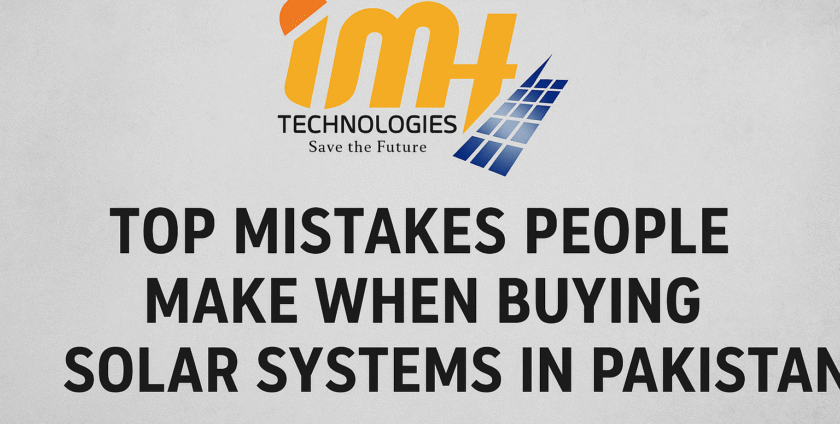
Top Mistakes People Make When Buying Solar Systems in Pakistan
Discover the most common mistakes Pakistanis make when buying solar systems and learn how to avoid them for better efficiency, savings, and reliability.
Introduction
As electricity costs in Pakistan continue to rise, more homeowners and businesses are turning to solar energy to reduce their monthly bills. However, while the idea of going solar sounds simple, many buyers make costly mistakes during the purchasing and installation process. These errors can reduce system efficiency, shorten equipment lifespan, and delay the return on investment.
In this blog, we’ll highlight the top mistakes people make when buying solar systems in Pakistan—and how you can avoid them to ensure your system delivers maximum performance and value.
1. Not Assessing Energy Requirements Properly
One of the most common mistakes is purchasing a solar system without calculating your actual energy usage. Many buyers select a system based on price alone, not realizing that an undersized system will fail to meet their needs, while an oversized system can waste money.
Tip:
Always check your last 12 months’ electricity bills to find your average monthly consumption. A professional solar company can perform a load assessment to recommend the right system size.
2. Choosing the Wrong Type of Solar System
In Pakistan, three main types of solar systems are available:
-
On-Grid (Grid-Tied)
-
Off-Grid (Battery-Based)
-
Hybrid Systems
Many people purchase the wrong type based on incomplete information. For instance, buying an on-grid system in an area with frequent load-shedding can be a big mistake, as it doesn’t work when the grid is down.
Tip:
Understand your energy situation before buying. A hybrid solar system is ideal for most Pakistani households because it provides both grid support and backup power.
3. Ignoring Product Quality and Brand Reputation
Some customers choose cheaper panels, inverters, or batteries to save money initially. However, low-quality components often result in poor efficiency and frequent breakdowns.
Tip:
Invest in Tier-1 solar panels and certified inverters from trusted brands such as Inverex. A slightly higher upfront cost ensures better long-term performance and durability.
4. Not Verifying Installer Experience
Solar system installation is a technical process that requires skilled professionals. Hiring an inexperienced or unlicensed installer can lead to wiring issues, safety risks, and low output efficiency.
Tip:
Choose a registered solar installation company that offers complete design, installation, and after-sales service. Check reviews, certifications, and previous projects before making a decision.
5. Ignoring After-Sales Support and Warranty
Many buyers overlook warranty details and after-sales services when comparing prices. A solar system is a long-term investment that requires periodic maintenance, monitoring, and occasional repairs.
Tip:
Always confirm:
-
Solar panels should come with at least a 25-year performance warranty.
-
Inverters should have a 5- to 10-year product warranty.
-
The installer should provide ongoing support and maintenance.
6. Poor System Placement and Design
Improper panel orientation or shading from nearby trees and buildings can significantly reduce power generation. Some buyers ignore these factors during installation, leading to low system efficiency.
Tip:
Ensure your panels are installed at the correct tilt angle and direction (usually south-facing in Pakistan) to maximize sunlight exposure. A professional site survey can help optimize design.
7. Focusing Only on Price Instead of Value
Many people compare solar quotes solely based on the lowest price, not realizing that quality, performance, and service vary widely. A cheap system may cost less today but result in higher maintenance and energy loss later.
Tip:
Compare complete system value—including equipment quality, brand reputation, installation quality, warranty, and long-term savings.
8. Not Considering Net Metering
Net metering allows you to sell excess electricity back to the grid and reduce your monthly bill. Unfortunately, many buyers skip this feature or don’t complete the registration process.
Tip:
Always choose a solar company that provides net metering installation and documentation support. It maximizes your return on investment and makes your system more profitable.
Conclusion
Buying a solar system in Pakistan is a smart financial and environmental decision—but only when done correctly. By avoiding these common mistakes, you can ensure your system is efficient, durable, and delivers the savings you expect.
For a professional solar consultation, system design, and installation, choose a trusted company like IMH Technologies—offering reliable solar energy solutions, high-quality products, and full net metering support.
- By: IMH Technologies
- Tags: hybrid solar systems., Net Metering, Solar Energy Tips, Solar Installation Guide, Solar Systems Pakistan
- 0 comment

Leave a Reply